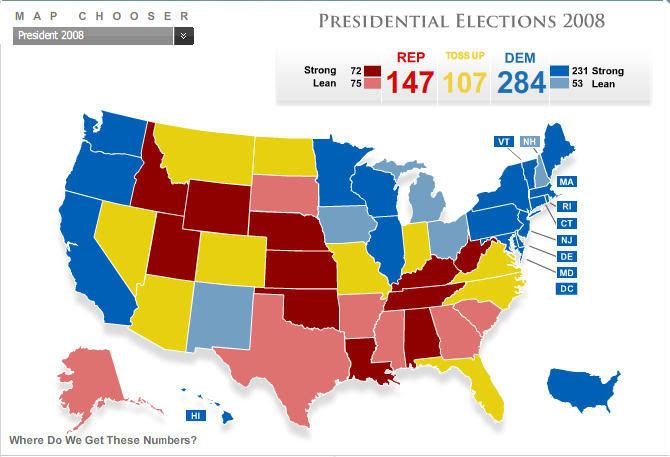Is the GOP "a regional party based in the South?"
Front-page DailyKos contributor DemFromCT leads a post today with this one-liner:
There are 92 day [sic] until Republicans formally become a regional party based in the South.
This assertion -- that the GOP is a party whose only base is in the South -- is often made. One can find a similar post by fladem at OpenLeft. But is it true?
First, let's consider the evidence. DemFromCT's link takes you to a recent Gallup poll, which has the following table on current presidential preference ratings:

In other words, all we have to back up the claim is that (a) in one political race out of the many happening this year, (b) John McCain holds a meager 3% lead over Barack Obama -- (c) within Gallup's margin of error -- (d) in one poll.
Hardly seems like strong evidence that the South is solid GOP territory. But this is how myths like "South = Republican" start, spread and multiply.
Indeed, the real story of 2008 is that so many Southern states are suddenly in play in the presidential race (not to mention Senate, House, gubernatorial, state legislature and local races).
Depending on whose poll numbers you use, four to five of the 13 states in the South are now very much contested terrain. RealClearPolitics lists three -- Florida, North Carolina and Virginia -- as toss-ups based on the latest aggregation of polls.
Compare that to, say, the Great Plains. Out of the 10 states that comprise Plains states, RealClearPolitics poll data leads them to conclude only two -- Colorado and New Mexico -- are toss-ups; five are "solid McCain."
Indeed, this map from OpenLeft last Saturday, which also uses poll analysis to predict which states are toss-ups, reveals a similar truth:

The number of "solid Republican" vs. toss-up states isn't much different between the South and Great Plains.
So couldn't one just as easily say the Republican Party is now a party headquartered in the Great Plains?
What's more, the analysis of DemFromCT, OpenLeft and others -- based on snap-shot polls of one race -- misses the most important fact: that the South is a dynamic, rapidly changing region.
In states that identify party registration, vastly more Democrats are registered in the South than in Great Plains states -- and Southern states have added more Democrats in 2008 than those in the Plains.
Long-term, the South is undergoing the most rapid demographic change in the country, pushing the region in a multi-racial and more cosmopolitan direction that will benefit Democrats. The impact of this new Southern future is already being felt: as David Bacon wrote in The American Prospect earlier this year, Mississippi -- a state soon to become a "majority minority" state, as defined by the Census -- is already seeing a major political re-alignment underway.
Democrats should take little comfort in believing that Republicans are "only" dominant in the South, given that the region's political clout is drastically expanding.
But the reality is that the claim just doesn't hold water.
Tags
Chris Kromm
Chris Kromm is executive director of the Institute for Southern Studies and publisher of the Institute's online magazine, Facing South.
